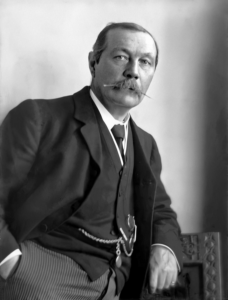
Was Sir Arthur Conan Doyle Jack the Ripper? Best known as the creator of Sherlock Holmes, he has indeed been mentioned in the vast web of Jack the Ripper theories. Although this is more of a fringe theory and lacks any substantial evidence. Let’s delve into some of the points surrounding this rather unusual claim:
Fictional Deduction: The main argument linking Doyle to the Ripper murders is a literary one. Proponents suggest that only someone with an intimate knowledge of the crimes could depict murder and deduction so vividly as Doyle does in the Sherlock Holmes stories. This, of course, is a weak premise, as many writers describe events and settings in intricate detail without having firsthand experience.
Medical Knowledge: Doyle was trained as a doctor, and some theories suggest that the person responsible for the Ripper murders had some anatomical or surgical knowledge, given the nature of the mutilations. However, many others in London at the time
In the dim, gaslit streets of Victorian London, the infamous figure of Jack the Ripper lurked, casting a long and terrifying shadow. As the city grappled with the reality of such gruesome murders, theories abounded on the Ripper’s true identity. Among the sea of names whispered, one stands out not for the weight of evidence behind it, but for its sheer audacity: Sir Arthur Conan Doyle, the famed creator of Sherlock Holmes.
It seems almost sacrilegious to even hint at such a connection. How could the mind that brought forth the world’s greatest detective also be responsible for such heinous crimes? The very idea appears to be the stuff of sensationalist fiction, yet there are those who believe that beneath Doyle’s esteemed exterior lurked a much darker side.
The foundation of this theory rests largely on Doyle’s written works. Sherlock Holmes, with his astute powers of deduction, often found himself unraveling intricate crimes, some of which bore a chilling resemblance to the modus operandi of Jack the Ripper. Could it be possible, some wondered, that Doyle’s intimate knowledge of criminality was not merely the product of a vivid imagination, but of personal experience? The line between writer and character, they suggested, might be thinner than we’d like to believe.
Having read all of the Sherlock Holmes stories, there is one thing of particular interest to me. Doyle almost always portrayed the police as somewhat incompetent and lacking the necessary imagination and intelligence to be great detectives. Is this a hint???
Moreover, Doyle wasn’t just a writer; he was a trained physician. The brutality and precision of the Ripper’s crimes suggested to some that the killer had anatomical or surgical knowledge. Here again, the fingers of suspicion pointed, however faintly, toward Doyle. The meticulous dissections carried out on the Ripper’s victims were the kind only someone with a keen understanding of the human body could execute.
And yet, the idea that Doyle, a respected author and physician, could be the shadowy figure of Jack the Ripper feels like a stretch of the most overactive imaginations. The speculative links are tenuous at best. Doyle’s life, filled with literary pursuits, engagements, and his own personal challenges, seemed to leave little room for a double life as London’s most feared killer.
As intriguing as it may be to think that Doyle, in a bout of twisted inspiration, might have taken to the streets of Whitechapel, it’s essential to remember that theories must be built on more than mere speculation. The burden of proof, after all, lies heavy, and in the case of Doyle being Jack the Ripper, the scales of evidence seem decidedly empty.
So, was Sir Arthur Conan Doyle Jack the Ripper? In the annals of unsolved mysteries, the identity of Jack the Ripper remains one of the most tantalizing. The allure of connecting a famous name like Doyle to the case is understandable, but in the cool light of reason, much like the deductions of Sherlock Holmes himself, it seems improbable. In the end, it might be best to chalk up such theories to the love of a good story rather than the pursuit of truth.